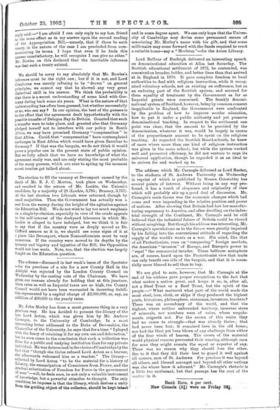Lord Balfour of Burleigh delivered an interesting speech on denominational
education at Alloa last Saturday. The Scottish educational settlement of 1872, he contended, was conceived on broader, bolder, and better lines than that arrived at in England in 1870. It gave complete freedom to local authorities to deal with religious instruction, while it recog- nised voluntary schools, not as existing on sufferance, but as an enduring part of the Scottish system, and secured for them equality of treatment by the Government as far as Imperial grants were concerned. The frankly denomi- national system of Scotland, however, being by common consent inapplicable to England, the Government were confronted by the problem of how to improve secular education, how to put it under a public authority and yet preserve denominational teaching. In respect to the settlement one point was clear, that the amount to be provided by the denomination, whatever it was, would be largely in excess of the proportionate amount to be spent on the religious teaching. As regarded the Scottish Board-schools, he knew of cases where more than one kind of religious instruction was given in the same school; but while the system worked well and promoted efficiency, he did not venture to urge .its universal application, though he regarded it as an ideal to be striven for and worked up to.










































 Previous page
Previous page